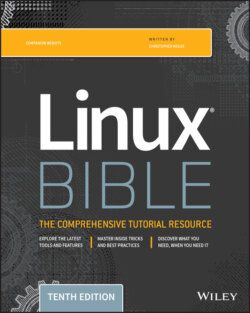Читать книгу Linux Bible - Christopher Negus - Страница 17
CHAPTER 1 Starting with Linux IN THIS CHAPTER
ОглавлениеLearning what Linux is
Learning where Linux came from
Choosing Linux distributions
Exploring professional opportunities with Linux
Becoming certified in Linux
The operating systems war is over, and Linux has won. Proprietary operating systems simply cannot keep up with the pace of improvements and quality that Linux can achieve with its culture of sharing and innovation. Even Microsoft, whose former CEO Steve Ballmer once referred to Linux as “a cancer,” now says that Linux's use on its Microsoft's Azure cloud computing service has surpassed the use of Windows.
Linux is one of the most important technological advancements of the twenty-first century. Beyond its impact on the growth of the Internet and its place as an enabling technology for a range of computer-driven devices, Linux development has become a model for how collaborative projects can surpass what single individuals and companies can do alone.
Google runs thousands upon thousands of Linux servers to power its search technology. Its Android phones are based on Linux. Likewise, when you download and run Google's Chrome OS, you get a browser that is backed by a Linux operating system.
Facebook builds and deploys its site using what is referred to as a LAMP stack (Linux, Apache web server, MySQL database, and PHP web scripting language)—all open source projects. In fact, Facebook itself uses an open source development model, making source code for the applications and tools that drive Facebook available to the public. This model has helped Facebook shake out bugs quickly, get contributions from around the world, and fuel its exponential growth.
Financial organizations that have trillions of dollars riding on the speed and security of their operating systems also rely heavily on Linux. These include the New York Stock Exchange, Chicago Mercantile Exchange, and the Tokyo Stock Exchange.
As cloud continues to be one of the hottest buzzwords today, a part of the cloud groundswell that isn't hype is that Linux and other open source technologies continue to be the foundation on which today's greatest cloud innovations are being built. Every software component that you need to build a private or public cloud (such as hypervisors, cloud controllers, network storage, virtual networking, and authentication) is freely available for you to start using from the open source world.
The widespread adoption of Linux around the world has created huge demand for Linux expertise. This chapter starts you down a path to becoming a Linux expert by helping you understand what Linux is, where it came from, and what your opportunities are for becoming proficient in it.
The rest of this book provides you with hands-on activities to help you gain that expertise. Finally, I show you how to apply that expertise to cloud technologies, including automation tools, such as Ansible, and containerization orchestration technologies, such as Kubernetes and OpenShift.
